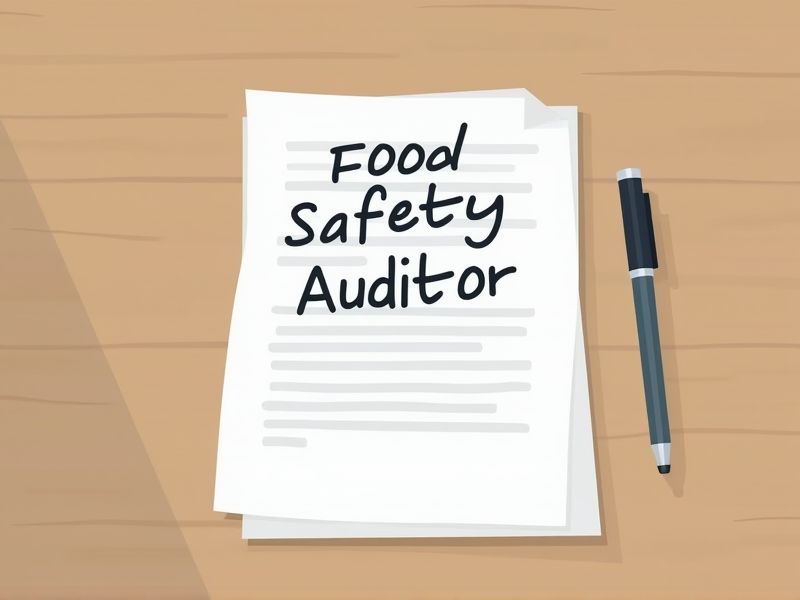
The role of a Food Safety Auditor is crucial in maintaining public health and ensuring compliance with food safety standards. Certification equips auditors with the necessary knowledge and skills to navigate complex regulations and identify potential hazards effectively. Certified professionals demonstrate a commitment to high-quality assessments, fostering trust with stakeholders. Some important certifications you may need for a Food Safety Auditor include those in HACCP and ISO 22000.
HACCP Certification
HACCP certification provides a structured framework for identifying and controlling food safety hazards, essential for auditors to ensure comprehensive risk assessments. Auditors with HACCP certification possess the expertise to implement and evaluate preventative measures that align with international food safety standards. This certification ensures that auditors are skilled in verifying critical control points, crucial for maintaining the safety and quality of food production processes. Food safety auditors with HACCP certification contribute to building consumer trust by demonstrating a commitment to rigorous safety protocols.
ISO 22000 Lead Auditor Certification
The ISO 22000 Lead Auditor Certification equips individuals with the skills to assess and ensure compliance with international food safety standards. By understanding these standards deeply, auditors can effectively identify potential risks in food production processes. Without this certification, it would be challenging for an auditor to provide reliable assurance of food safety management systems. This certification also enhances credibility and trust among clients and stakeholders in the food industry.
ServSafe Food Protection Manager Certification
ServSafe Food Protection Manager Certification verifies a food safety auditor's knowledge of proper food handling and sanitation practices. It equips auditors with comprehensive guidelines, reducing the risk of foodborne illnesses in inspected establishments. Certification ensures auditors can accurately assess compliance with food safety regulations. Maintaining standardized knowledge fosters credibility and trust in the auditing process.
Certified Food Safety Auditor (CFSA) Certification
The CFSA Certification ensures a standardized level of competency among food safety auditors, which enhances trust with clients and regulatory bodies. Holding the certification often leads to improved career opportunities and earning potential in the competitive food industry. Certified auditors are equipped with the latest food safety regulations and practices, reducing the risk of foodborne illnesses. Organizations hiring CFSA-certified professionals can demonstrate their commitment to high-quality food safety standards, which can be pivotal in regulatory inspections and audits.
SQF Practitioner Certification
SQF Practitioner Certification provides a comprehensive understanding of the SQF Code, which enhances a food safety auditor's ability to evaluate and verify food safety systems effectively. Auditors with this certification have proven expertise in hazard analysis and critical control points, essential for identifying potential risks in food production. Organizations prioritize hiring certified auditors to ensure compliance with industry standards and regulatory requirements, which can lead to improved food safety outcomes. Certified practitioners bring an additional level of credibility and assurance to stakeholders, promoting consumer confidence in the safety and quality of food products.
FSSC 22000 Certification
FSSC 22000 Certification provides a comprehensive framework that ensures food safety auditors have a thorough understanding of international food safety standards. This certification enhances an auditor's credibility and trustworthiness, making them more reliable in assessing food safety management systems. Companies benefit because auditors with this certification can accurately identify potential risks and ensure compliance with global food safety regulations. Adoption of FSSC 22000 can lead to reduced incidents of foodborne illnesses, bolstering consumer confidence and improving public health outcomes.
PECB Food Safety Management System (FSMS) Auditor Certification
The PECB Food Safety Management System (FSMS) Auditor Certification ensures that auditors have a comprehensive understanding of international food safety standards, which leads to improved audit quality. This certification enhances credibility and trust with clients, as it demonstrates the auditor's commitment to recognized practices and methodologies. Certified auditors often meet global regulatory requirements and industry demands, which increases their employability and mobility opportunities. Holding this certification often results in more efficient and accurate audits, impacting the overall food safety and quality management systems of organizations.
Global Food Safety Initiative (GFSI) Benchmarking Course
GFSI Benchmarking Course provides food safety auditors with a standardized framework, enhancing consistency in auditing practices worldwide. Familiarity with GFSI's core benchmarking requirements ensures auditors can effectively evaluate if food businesses meet global safety standards. By understanding GFSI principles, auditors contribute to reducing foodborne illness risks, safeguarding public health. Knowledge from the course elevates an auditor's credibility and competence, influencing industry-wide trust and compliance.
BRCGS Food Safety Certification
BRCGS Food Safety Certification establishes a recognized benchmark for auditors, ensuring they understand global food safety standards. This certification helps auditors identify and assess risks within food manufacturing processes. It instills trust in auditors' expertise, assuring businesses of reliable audits and compliance checks. Companies benefit from hiring certified auditors by reducing potential safety hazards and minimizing regulatory issues.
Lean Six Sigma Green Belt Certification
Lean Six Sigma Green Belt Certification equips Food Safety Auditors with process improvement skills, enhancing their ability to identify inefficiencies in food safety operations. By understanding Six Sigma methodologies, auditors can implement statistical tools to minimize variations and ensure compliance with food safety standards. The certification fosters analytical skills that help in addressing systematic issues within food processing systems. Food Safety Auditors with this credential are often more adept at driving quality initiatives that lead to safer food production environments.
Summary
With certifications, you enhance your credibility and trustworthiness in the field of food safety auditing. This often leads to better job opportunities and career advancement options. Employers are more likely to rely on certified auditors for compliance assurance and risk management. Your knowledge and skills in food safety protocols increase significantly, resulting in improved audit outcomes.
